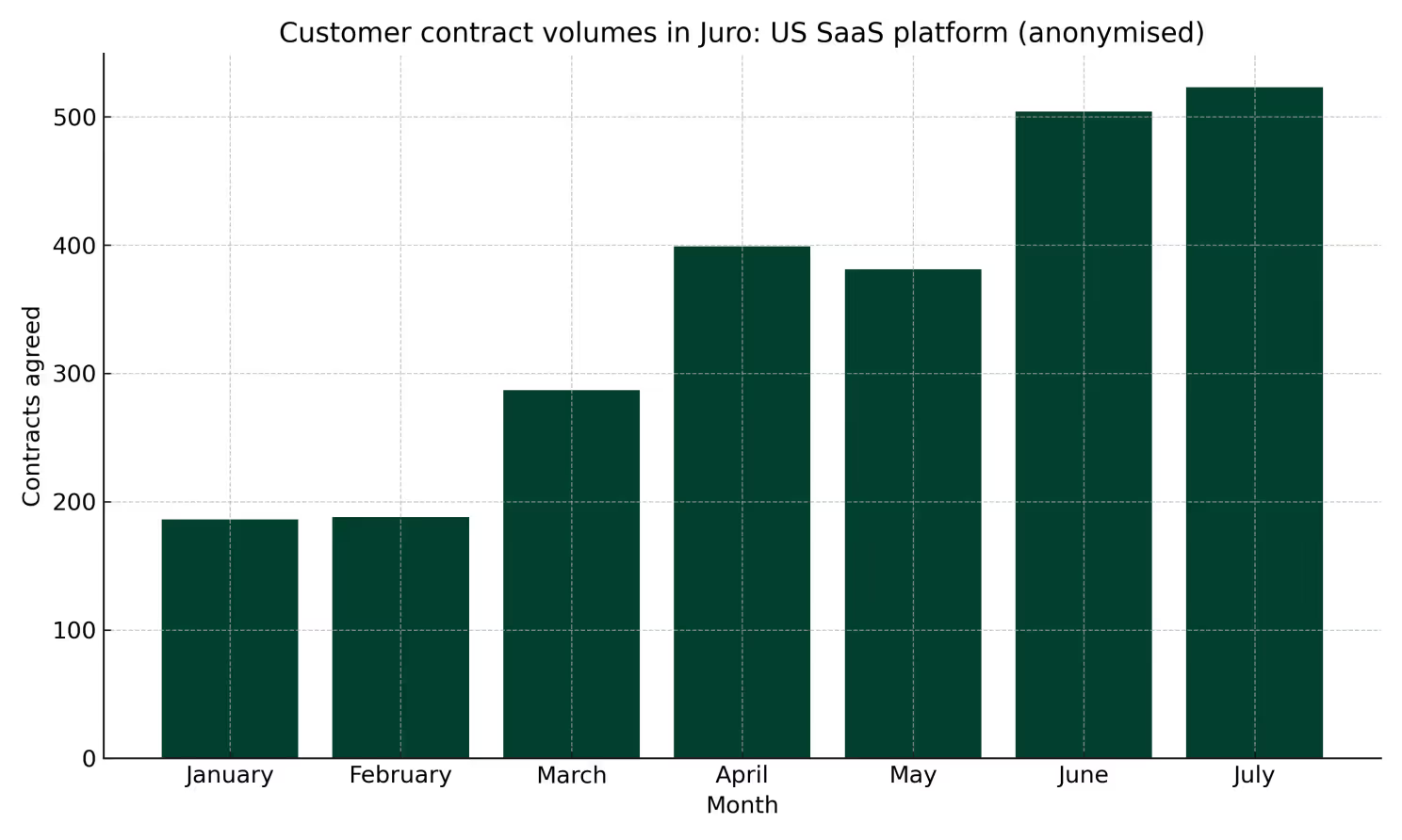Solutions
Customer Support
Resources


Finding the right use case, the right stakeholders, the right scope for a pilot, the right time to roll out, the right executive buy-in. All these things help.
But when we look at the most successful Juro customers, they all have one thing in common. And by ‘most successful’, I mean the folks who are processing and agreeing not handfuls or even dozens but hundreds, thousands, even tens of thousands of contracts in the platform - often with small teams.

I’d love to tell you it’s because dozens of employees in these companies wake up every day and think about Juro’s clean, modern UI...
For these customers, renewal conversations are easy. The idea of ripping out Juro is a nightmare that’s not even worth talking about.
I’d love to tell you it’s because dozens of employees in these companies wake up every day and think about Juro’s clean, modern UI, and the attention to detail in our workflows, and the scar tissue from ex-lawyers in the team that drives them to create unique solutions.
Nope.
It’s usually because they work with Juro where they do almost all their work. HubSpot. Or Salesforce. Or Slack. Or Teams. The business at large has a handful of platforms where most stuff happens; and business colleagues wish that the stuff that doesn’t happen there, could be done there.
For these customers, Juro integrates so deeply with that platform that they hardly know it’s there.
Just enough to get whatever they want done; not so much that we disrupt their core ways of working.
Juro is decentralized into the tools the business already uses. Not another tool to log in to, not a top-down mandate from Legal - just keep working like you have been, and legal automation slots in.
The hot topic in legal is and will continue to be AI, and nobody is more excited about that than us. Beta testing for our agentic solution for contract review has been awesome to watch. And of course it works in Teams and Slack, as well as Word.
But in so many cases, the secret ingredient for a successful, broad, impactful and long-lasting legal tech deployment I still think is integration.
Pointless … until they’re essential
The first integration we built back in 2018 was Salesforce, because of course it was - we wanted to be an easily adopted SaaS platform. But our second was an ATS. Why? Because in order to be an enterprise-wide platform you need to meet all teams where they live.
The great paradox is that integrations are completely meaningless features until you need them. If you don’t use them, they add no value and they accomplish nothing. Two-way live sync between Juro and Salesforce … who cares? Automatically attaching signed offer letters back to candidate files in Greenhouse … what’s Greenhouse?
But creating compliant contracts for your deal in one click from HubSpot, then tracking its status from draft to signature without leaving the platform? Well, in the right company, that can save monumental amounts of time. Like, two weeks time-to-sign down to two days:
Jessica Zwaan was so kind to share her Juro story with us, and if our company mission is to help the world agree faster, then honestly my eyes light up at that time-to-sign saving and the idea that commercial teams are more comfortable contracting autonomously now, without legal and operations needing to help them.
But would we even be in the room without our HubSpot and Slack integrations?
The concept of CLM is taking a beating at the moment from AI-only point solutions that want to leap ahead (who needs a repository after all!). With our agentic AI review plus connected workflows, and the wild things planned for our intelligent contract repository in Q3 (buckle up!) I feel pretty good about Juro embodying what comes after CLM. We’re ready to lead that charge.
But legal tech in general needs to be a little less self-absorbed. Our job isn’t to roll up with a giant shiny flashing new system that the whole company has to learn from scratch. The ego!
Almost any company already has a giant system that everyone loves working in - whether that’s Salesforce, HubSpot, Slack, Workday, Greenhouse or even Word. It’s our job at Juro to slot contracting into that way of working, in a way that accelerates key business metrics, encourages adoption, leverages the latest AI, and provides legal guardrails.
The contract intelligence layer needs to be everywhere, even if you can't see it - because you never know when you'll need to call on it.
Meet users where they live. That’s it.
Dial down the ego; dial up the integration. Help the world agree faster. Simple.

Richard Mabey is the CEO and co-founder of Juro, the intelligent contract automation platform. Under his leadership, Juro has scaled rapidly, backed by $38 million in venture funding from prominent investors including Eight Roads, USV, Point Nine Capital and Seedcamp, and the founders of companies like Indeed, Gumtree and Wise.
Richard trained and qualified at Freshfields Bruckhaus Deringer, working as an M&A associate in London and New York. He gained an MBA from INSEAD, and then spent time at LegalZoom, learning to build legal tech products.
Frustrated by the manual legal processes that slow down businesses, Richard co-founded Juro in 2016, with a mission to help the world agree contracts faster. Beyond Juro, he hosts the "Brief Encounters" podcast, makes angel investments, and supports other ambitious ventures from the boardroom. Richard is a Fellow of the RSA, an adviser to The Entrepreneurs Network and sits as a Non-executive Director of Bright Blue.